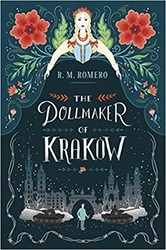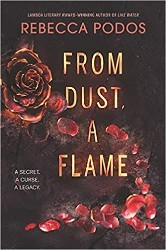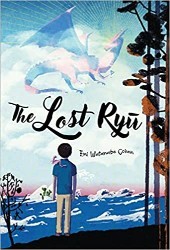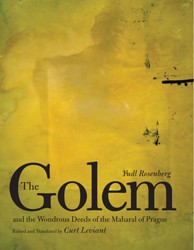Ilana López is the daughter of a Sephardic mother from Cuba and a non-Jewish Czech father. Both parents have fled communist dictatorships and are raising their daughter in multicultural Miami. Yet even in this cosmopolitan environment, Ilana feels unsure of who she is. Her career aspiration as a violinist is met with skepticism by a family more concerned with achieving high scores on college admissions exams. But when they send her to spend the summer with her aunt, an artist living in Prague, Ilana finds herself submerged in a dark and rich world of the Jewish past. R.M Romero’s ambitious verse novel explores how Ilana searches this past to discover who she is today.
Romero alludes to many aspects of Jewish folklore, popular culture, and classical music in her varied metaphors. When Ilana arrives at her aunt’s home, she becomes attracted to the untended tombstones in the local Jewish cemetery. They have been neglected and misused, but she recognizes an opportunity in them to learn about the Jews who have been marginalized by the surrounding dominant culture. Magical realism enters the story when she meets a ghost and falls in love. At the same time, a vodník (evil water spirit), who both literally and spiritually feeds on the souls of the dead, becomes her nemesis. The author also verbalizes the ordinary anguish of teenagers, underscoring Ilana’s frustration that “I’m not a piece of music/too complicated/to be read/the way my parents/believe I am.”
The book’s narrative arc is as unusual as its eclectic poetic images. Chapters punctuate Ilana’s perspective with “interludes” that give the demonic character his own voice. She communicates by text message with her friends in Miami at the same time that she is drawn into a vortex of the dead, struggling to save from erasure those who have perished. Her interactions with these beings often have a vivid reality, as when she and a young companion in the cemetery teach one another Yiddish and Spanish. At times, transitions seem abrupt, as in when Ilana’s multiple concerns collide with one another in both her thoughts and actions. Readers who engage with the story’s complexities will ultimately empathize with one of Ilana’s most serious preoccupations: what does it mean to be a Jew? Here, her images take shape with beauty and precision, as she considers persecution, survival, spirituality, and courage as components of this great gift.
The challenges facing Jews of mixed cultural backgrounds have become a fertile ground for young adult novels. Romero offers a distinctive approach, emphasizing Ilana’s alienation from her family’s values, much more than confusion about which side of her heritage is more significant. Being Jewish is central from the beginning of the novel to the end, but only after living in two worlds does she fully understand the impact of this fact: “Anyone I ever love/will have to hear/my history.”
Emily Schneider writes about literature, feminism, and culture for Tablet, The Forward, The Horn Book, and other publications, and writes about children’s books on her blog. She has a Ph.D. in Romance Languages and Literatures.





